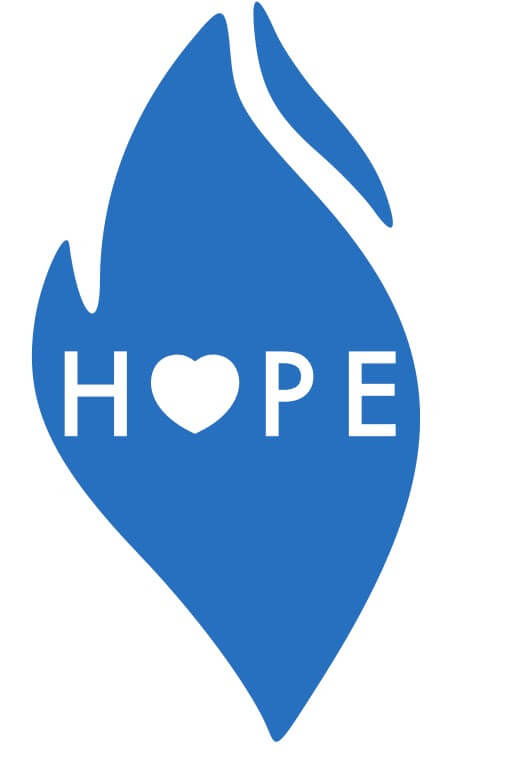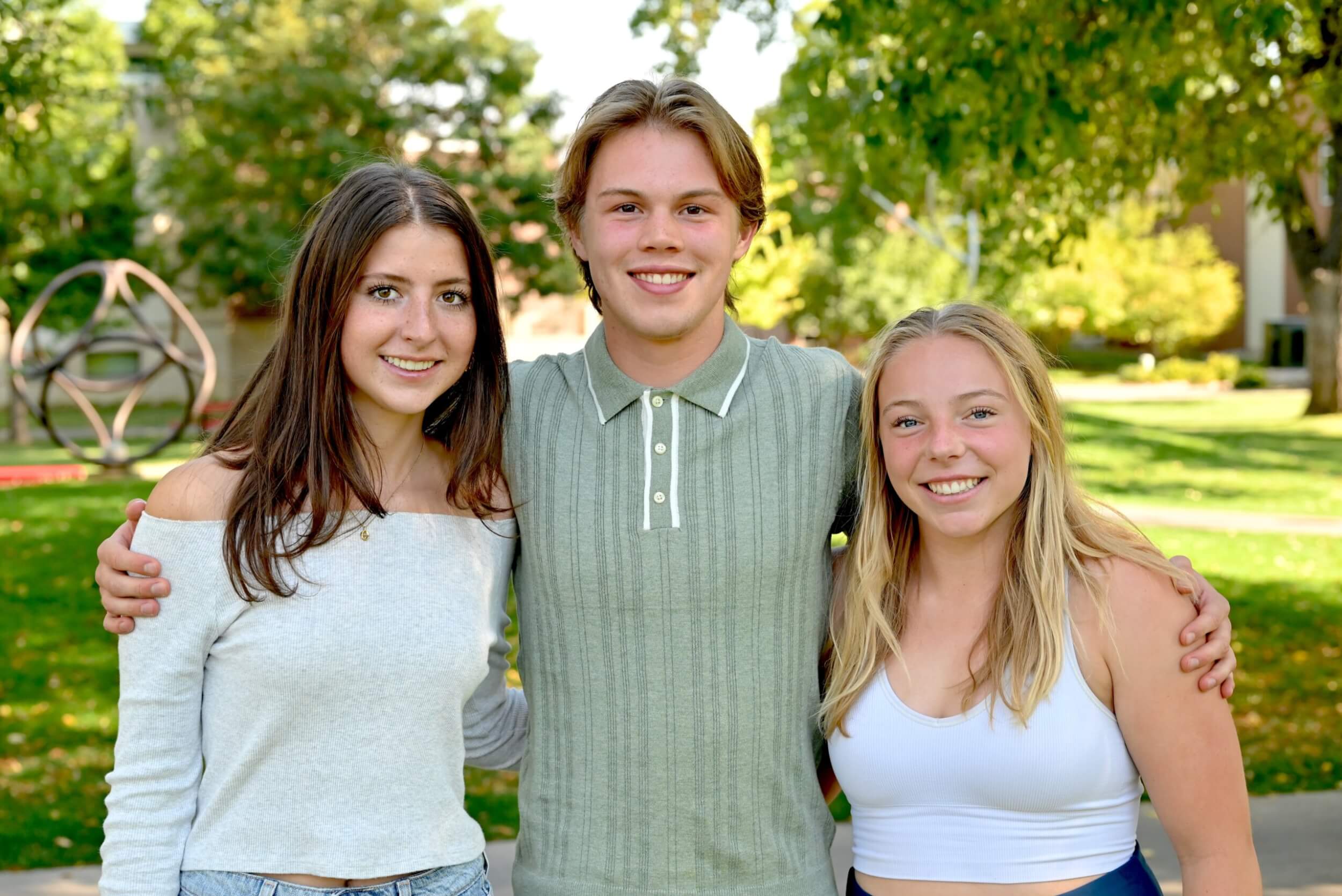Colorado Academy’s largest student-led organization, HOPE, has grown to become a philanthropic “known quantity” in the region over its 31 years in existence, serving thousands of residents in the southwest Denver neighborhoods a stone’s throw from campus. Yet, though the mission has remained the same across the decades—to brighten the holiday season for families in need by offering them free clothing, school supplies, toiletries, baby essentials, toys, food, medical care, fun activities, community services, and much more, all on one day in December—HOPE’s student leaders have always sought ways to evolve and adapt to serve those most at risk in Denver’s changing socio-economic landscape.
Most recently, in 2020, when the annual in-person HOPE event had to be canceled because of COVID-19 restrictions, students nonetheless found a way to help those in the local community who were most affected by increased job loss, food insecurity, sickness, and other pandemic side-effects. Organizers spread the word with CA families and raised enough funding to offer hundreds of valuable Target gift cards to the family members of every student enrolled in Horizons Colorado at CA.
Since then, HOPE’s Senior leaders have worked to rebuild their signature event, which in Decembers past had drawn over 2,000 people to campus to select donated clothing, baby supplies, and health services. By 2023, HOPE was able to attract nearly 1,000 southwest Denver neighbors to the Athletic Center to peruse row upon row of neatly organized items, and in 2024, the leadership team looks to break the 1,000-visitor mark once again on Saturday, December 14.
HOPE is hosting drop-off days in the Upper School Circle where volunteers will help unload clothes, personal care items, and toys from cars. These dates are October 24, November 22, and December 5, and drop-off assistance will run from 7:50-8:40 a.m.
Drives:
Upper School: Clothing and feminine care product donations accepted now through December 7. There will be labeled bins in the Upper School main entryway.
Middle School: Diaper donations accepted November 11 through December 5. There will be labeled bins in the Middle School lobby.
Lower School: Backpacks, school supplies, and toy donations accepted November 11 through December 5. There will be labeled bins in the Lower School lobby.
“We definitely want as many people to benefit from this year’s event as possible,” attests 2024 co-president Ella Merwin Olk, who is supervising HOPE’s community outreach section. “That’s what all the work we’ve been doing comes down to. But success is also seeing the impact on the day of the event, when you can watch a child unwrap a holiday gift or a mom get the extra clothing their family needs.”
Along with her fellow Senior co-presidents, Oliver Twite and Addie Chandler, Merwin Olk has spent weeks at the start of the school year recruiting and onboarding 60-70 student directors, who manage everything from securing vaccines and the services of local doctors for guests to creating cheerful holiday decorations and wrapping presents. New for this year, one group of students will focus on voter registration.
Just like on the day of the actual event, explains Chandler, “The behind-the-scenes to make all this happen can be chaotic—but it’s the good kind of chaos.” Each of the co-presidents guides the work of three or four sections, while spending hours each day answering email, making calls, and crafting the communications that go out to the community in the months before the December event.
“Being in a leadership role, you realize that there’s so much more work to do than what you see on the day of HOPE,” adds Merwin Olk. “I never realized we were the people who’d have to meet with the division principals to plan the donation drives or write marketing messages every week!”
It may be a lot to take on during a Senior year that’s already filled to the brim with college applications, advanced coursework, and even post-season athletic competitions, but, says Twite, “HOPE is the first thing I sit down to work on when I get home after school, just to go through email and make sure that everything’s going well.”
“I know it sounds cringey,” continues Merwin Olk, “but HOPE has really turned into a passion for me. It’s the kind of work I enjoy doing. And it’s also great to know that I’m leaving a legacy by continuing the efforts that so many past co-presidents have put into this. Being part of the community of students involved in HOPE is something that’s so valuable.”
Years of institutional knowledge
All three of this year’s co-presidents have been involved with HOPE for years. Twite got his start as an event volunteer while still in Middle School. “Then in high school I realized how much impact you could make, and I just started pursuing it and building on the knowledge I gained the year before.”

For Merwin Olk, HOPE was one of many clubs she signed up to join during her first week at CA, as a Ninth Grader. “At first I was intimidated, because most of the others in my section were older,” she recalls. “But I quickly figured out that HOPE is so much more than the group of people you’re working with every day: The number of students who are involved here at CA, and all of those we reach in the greater Denver community—when my time at CA comes to an end, that’s what I’ll be most proud of.”
Chandler’s older siblings were part of HOPE before her; each year they’d pick a day for the family to clear out their closets to gather donations. So when it was her turn, there was no hesitation about joining in, despite a competing fall commitment to the high-profile Field Hockey program, which Chandler has helped lead to two State Championships. “It’s definitely a lot of pressure,” she says, “but you always have a choice to look at that as a positive or a negative. For me and my co-presidents, pressure pushes us forward.”
With more than a dozen years of institutional knowledge between them, Chandler, Merwin Olk, and Twite have made it their mission this year to update and compile detailed documentation of every aspect of HOPE, from key contacts at local nonprofits to the major milestones between the beginning of school and the arrival of the guests on a December Saturday. As part of their HOPE legacy, they want to leave future leaders with a great resource to draw on.
At the same time, Merwin Olk notes, “That kind of speaks to how the three of us are as leaders: We want to make sure that nothing goes unseen and that we’re sticking to our timeline, because people are depending on us to execute our role the best that we can.”
Behind the scenes, the three co-presidents have found that supporting each other is just as important. “We’ve really done a good job of being there for each other,” says Merwin Olk, who partnered with Twite to manage vaccines for the 2023 event. “One of us will step into a meeting if someone else is busy with sports practice or taking a test.” HOPE, she adds, has revealed so many of the unseen skills that effective leadership requires.
The most important lessons
A big part of HOPE, Chandler points out, is getting outside of the CA “bubble.” “Reaching out to people at the different organizations can be nerve-wracking. But it’s good nervous, and we have each other to fall back on.”
The co-presidents spend much of their time encouraging their section directors to step outside of their CA comfort zone, too.
“Everyone has seen how fun it is to be involved in the holiday decorations, games, and presents, so they all want to join those sections,” explains Chandler. “But the reality is that not all the work can be that fun.”
Elaborates Merwin Olk, “I have definitely given a few pep talks to my community outreach group. They’re the ones who are calling under-resourced schools and health clinics to build partnerships and spread the word to people who might benefit from HOPE. I’ve told them, ‘I know this might not be comfortable or easy for you in the moment, but in the long run you can credit the success of the event to your efforts.’”
Delegating and communicating effectively also become increasingly important as the event date nears, Chandler says. “These are skills we need to get everything done, to keep our directors and associates motivated and on track.” She notes they are also skills for real life, benefiting those younger students who will one day occupy leadership roles, with HOPE and beyond.
Observing that CA students who are fluent in Spanish greet and assist HOPE guests on the day of the event, Chandler reflects, “It’s important to interact with the people you’re helping. It’s a skill that you can learn, and it’s small acts like that which make a big difference. To see one kid’s face when they receive a gift, or women and girls when they take home care products they might need—it’s super-important to reach out and provide for those in your community.”
